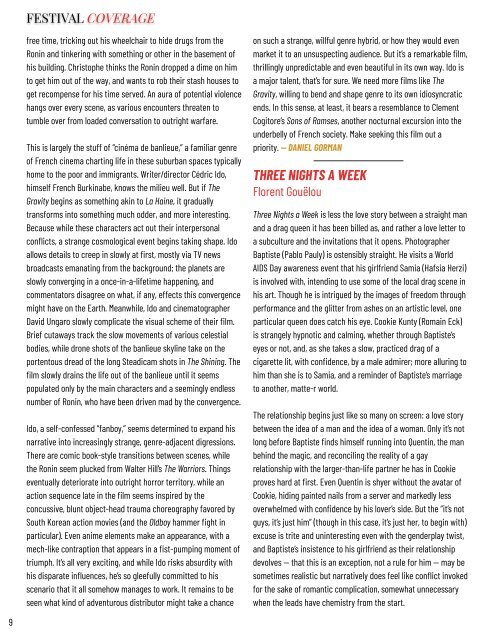InRO Weekly — Volume 1, Issue 10
You also want an ePaper? Increase the reach of your titles
YUMPU automatically turns print PDFs into web optimized ePapers that Google loves.
FESTIVAL COVERAGE<br />
free time, tricking out his wheelchair to hide drugs from the<br />
Ronin and tinkering with something or other in the basement of<br />
his building. Christophe thinks the Ronin dropped a dime on him<br />
to get him out of the way, and wants to rob their stash houses to<br />
get recompense for his time served. An aura of potential violence<br />
hangs over every scene, as various encounters threaten to<br />
tumble over from loaded conversation to outright warfare.<br />
This is largely the stuff of “cinéma de banlieue,” a familiar genre<br />
of French cinema charting life in these suburban spaces typically<br />
home to the poor and immigrants. Writer/director Cédric Ido,<br />
himself French Burkinabe, knows the milieu well. But if The<br />
Gravity begins as something akin to La Haine, it gradually<br />
transforms into something much odder, and more interesting.<br />
Because while these characters act out their interpersonal<br />
conflicts, a strange cosmological event begins taking shape. Ido<br />
allows details to creep in slowly at first, mostly via TV news<br />
broadcasts emanating from the background; the planets are<br />
slowly converging in a once-in-a-lifetime happening, and<br />
commentators disagree on what, if any, effects this convergence<br />
might have on the Earth. Meanwhile, Ido and cinematographer<br />
David Ungaro slowly complicate the visual scheme of their film.<br />
Brief cutaways track the slow movements of various celestial<br />
bodies, while drone shots of the banlieue skyline take on the<br />
portentous dread of the long Steadicam shots in The Shining. The<br />
film slowly drains the life out of the banlieue until it seems<br />
populated only by the main characters and a seemingly endless<br />
number of Ronin, who have been driven mad by the convergence.<br />
Ido, a self-confessed “fanboy,” seems determined to expand his<br />
narrative into increasingly strange, genre-adjacent digressions.<br />
There are comic book-style transitions between scenes, while<br />
the Ronin seem plucked from Walter Hill’s The Warriors. Things<br />
eventually deteriorate into outright horror territory, while an<br />
action sequence late in the film seems inspired by the<br />
concussive, blunt object-head trauma choreography favored by<br />
South Korean action movies (and the Oldboy hammer fight in<br />
particular). Even anime elements make an appearance, with a<br />
mech-like contraption that appears in a fist-pumping moment of<br />
triumph. It’s all very exciting, and while Ido risks absurdity with<br />
his disparate influences, he’s so gleefully committed to his<br />
scenario that it all somehow manages to work. It remains to be<br />
seen what kind of adventurous distributor might take a chance<br />
on such a strange, willful genre hybrid, or how they would even<br />
market it to an unsuspecting audience. But it’s a remarkable film,<br />
thrillingly unpredictable and even beautiful in its own way. Ido is<br />
a major talent, that’s for sure. We need more films like The<br />
Gravity, willing to bend and shape genre to its own idiosyncratic<br />
ends. In this sense, at least, it bears a resemblance to Clement<br />
Cogitore’s Sons of Ramses, another nocturnal excursion into the<br />
underbelly of French society. Make seeking this film out a<br />
priority. <strong>—</strong> DANIEL GORMAN<br />
THREE NIGHTS A WEEK<br />
Florent Gouëlou<br />
Three Nights a Week is less the love story between a straight man<br />
and a drag queen it has been billed as, and rather a love letter to<br />
a subculture and the invitations that it opens. Photographer<br />
Baptiste (Pablo Pauly) is ostensibly straight. He visits a World<br />
AIDS Day awareness event that his girlfriend Samia (Hafsia Herzi)<br />
is involved with, intending to use some of the local drag scene in<br />
his art. Though he is intrigued by the images of freedom through<br />
performance and the glitter from ashes on an artistic level, one<br />
particular queen does catch his eye. Cookie Kunty (Romain Eck)<br />
is strangely hypnotic and calming, whether through Baptiste’s<br />
eyes or not, and, as she takes a slow, practiced drag of a<br />
cigarette lit, with confidence, by a male admirer; more alluring to<br />
him than she is to Samia, and a reminder of Baptiste’s marriage<br />
to another, matte-r world.<br />
The relationship begins just like so many on screen: a love story<br />
between the idea of a man and the idea of a woman. Only it’s not<br />
long before Baptiste finds himself running into Quentin, the man<br />
behind the magic, and reconciling the reality of a gay<br />
relationship with the larger-than-life partner he has in Cookie<br />
proves hard at first. Even Quentin is shyer without the avatar of<br />
Cookie, hiding painted nails from a server and markedly less<br />
overwhelmed with confidence by his lover’s side. But the “it’s not<br />
guys, it’s just him” (though in this case, it’s just her, to begin with)<br />
excuse is trite and uninteresting even with the genderplay twist,<br />
and Baptiste’s insistence to his girlfriend as their relationship<br />
devolves <strong>—</strong> that this is an exception, not a rule for him <strong>—</strong> may be<br />
sometimes realistic but narratively does feel like conflict invoked<br />
for the sake of romantic complication, somewhat unnecessary<br />
when the leads have chemistry from the start.<br />
9
















